#Indian Express News Service
Text
From hospital gate to upmarket store, fuel squeeze chokes Colombo
From hospital gate to upmarket store, fuel squeeze chokes Colombo
🔴 An official who worked at former prime minister Mahinda Rajapaksa’s office says she’s been trying her luck in the fuel queue for the past three days, without success.
🔴 Another official at former president Gotabaya Rajapaksa’s office says he has “just enough” to get to the market. He used to get fuel from government sheds earlier but not after Rajapaksa fled.
🔴 A senior Sri Lankan diplomat has…

View On WordPress
#chokes#Colombo#Express News#Express News Service#fuel#Gate#gotabaya rajapaksa#hospital#Indian Express News Service#ranil wickremesinghe#squeeze#Sri lanka crisis#Sri lanka news#store#upmarket#World News
0 notes
Link
You can book an outstation cab like an online car rental service, a local cab, or a luxury car rental service no matter where you are in India.
#taxi service#Outstation taxi service#travel#news#indian express news#Outstation car rental#online car booking#Taxi Booking#Online Cab Booking
1 note
·
View note
Text
Trying to start a giant-ass meta on why I ship Mycroft/Albert and what there is to see of it and right off the bat I'm like...I want people to look at every single panel of their interactions.
No, it's not Sherliam levels. And BIG OLD DISCLAIMER: very little of what I'm going to present here is like "We were clearly intended to read it this way." I'll always argue that Sherliam is meant to be romantic: it hits so many well-established notes and tropes it's almost impossible to think otherwise. MycAl is a bit different. I do think it's definitely like...we're welcome and even invited to see it. But a LOT of my shipping it comes from the way I personally read and interpret things. So this is about explaining what I'm seeing that makes me ship it, rather than trying to be like "This is canon and you should agree with me." Anyway, for reference, I'll be using the official translation as far as it goes and then swapping to teawaffles' wonderful translation for the rest!
So...like right off the bat throughout the entirety of their Chapter 4 interactions their body language and expressions and ways of talking are so flirty? (Also, I still find it funny that in the manga Mycroft is introduced before Sherlock and thus Mycal is introduced before Sherliam. Older bros first lol.)
Maybe it's just that 2 decades on the internet have skewed me towards reading suggestiveness into everything, but the way Mycroft addresses Albert feels so flirtatious even if he's literally just being normal. "And what would an Indian Army official such as yourself want from an intelligence official such as myself this late in the evening?" Like...am I crazy? Does that not kinda sound like a porn intro? 😂 (This could also be Sherliam Side-effects. The way they call each other Professor and Detective in That One Scene is like...almost undeniably foreplay. Now every time anyone calls each other by title/profession/rank is this series I assume they're hitting on each other.)
But also Albert is just so...handsy throughout that scene. He's touching Mycroft's knickknacks, and just sort of limp-wristing all over the place. And I mean, I think that's just one of Albert's public-facing personas (customer service peeps, you know what's up) but it definitely lends itself to the existence of Vibes.
Anyway, there's this parallel of "You have my attention. What do you want?" that I think is kinda neat. (But look how comparatively sad Mycroft looks in the second version!!!)
Chapter 4:

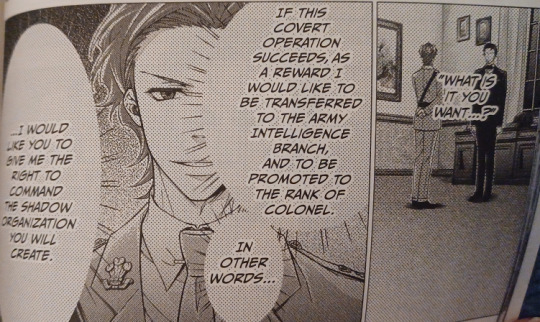
Chapter 23:
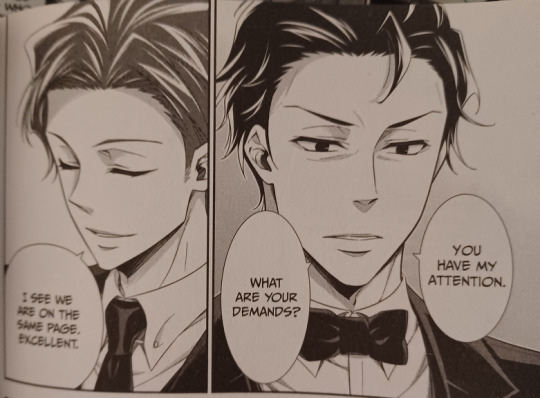
Btw, in Scandal in the British Empire...why does Mycroft introduce himself to the Queen? Never mind, not why we're here. Again, my weird innuendo sensors perk up in Chapter 17 at "I did not drag you out of bed this early for nothing." Maybe it's because my perception of Victorian niceties, whether it's factual or not, is that there was this sense of avoiding talk of physical realities. We don't speak of pregnancy, we speak of "her condition" and "confinement." We don't "go to bed," we "retire." And so on. So conversely, it feels almost suggestive to even acknowledge that someone was in bed. In whatever state of undress the might imply. *Kellen Goff Sasaki voice:* OOOH how sCanDaLOus. (Mind you I DON'T believe there is anything of authorial intent in this, again, just trying to explain the factors that make me read things a certain way.)
The little mind games: Albert immediately recognizing that he's being tested, and Mycroft well aware that something is off, that he and Albert are using each other to their own ends. All juicy ship ingredients.
Then there's this...I can't articulate why it's important. But it is. Something about mouths and thoughts. If I wasn't terribly lazy, I'd go digging for examples in various manga series and I have a pretty firm suspicion that I could prove that, often, Mouth-Focus Thinking Panel + Name = Ship.
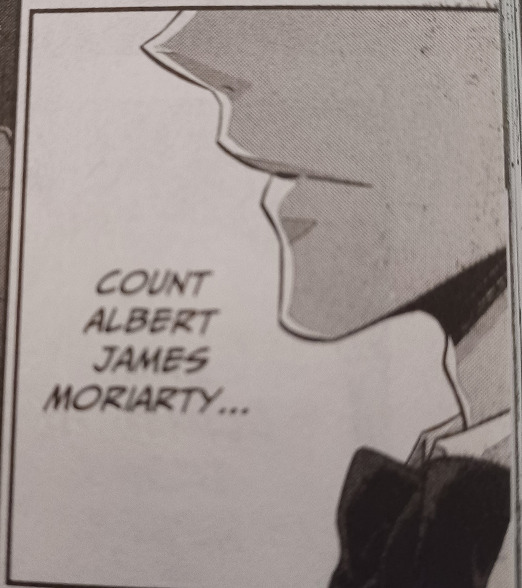
Jumping forward to the start of The Riot in New Scotland Yard (Chapter 29), Mycroft's demeanour has really changed. During the meeting at the British Museum he's radiating "I'm not angry I'm just disappointed" energy. He's tense, he's not sure if the Moriartys are enemies and when he understands their plan he seems understandably sad about it even as he accepts it. But now, he's radiating an almost Sherlock-like excitement. He's just gotten to see a miniature version of The Plan in action during the Jack the Ripper case, and it worked. He says he's just visiting Albert as an acquaintance (read: friend in Mycroftian), and that's what it feels like. They're chummy. It's cute. Also Albert teasing Mycroft over his squabbles with Sherlock when he leaves? When did Albert find out about that, hmm? (I mean, could be spying of course. But I like to think it just suggests they've talked more than we've seen.)
Annnnnd....cutting this part off here because I'm bored of it for now and it's long. I'll do the rest when the mood strikes. 😂
#yuukoku no moriarty#moriarty the patriot#mycal#alcroft#meta or something#been a while since i've done one of these 'not meta so much as just a disorganized stream of consciousness' long-posts lol
171 notes
·
View notes
Text
Enhypen members view of countries 🇧🇷🇮🇳🇵🇭.....Kpop Reading

Brazil 🇧🇷
They view this country as a country full of passion and energy. Like a very lively scenery in which something is always happening and a party is always around the corner. A place where you wouldn't want to be inside all day looking at a TV or scrolling through your phone, you'll actually want to go exploring
Enhypen seems to see this country as, yes a beautiful country where a lot of parties occur but they do seem to think that the place is kind of like a beautiful illusion. It's as if they know as a tourist you may getting a glamorized version of Brazil but if they were to live there, reality could hit that its a country with problems like any other country
Enhypen thinks Braizilians are very animated and expressive when they speak. the members may like how they can make ppl feel like family when they're really just strangers. I do see enhypen thinking Brazilians can be a bit overconfident and too aggressive like the type of ppl to stake claim to a person they find attractive and actively go after them (even if rejected still being persistent)
India 🇮🇳
Enhypen thinks it's a religious country with pretty buildings representing their religions. They like the land features of this country (I'm seeing some kind of rainforest). They also like the films this country produces
They may know of some of the political issues India faces (I'm not sure if acid attacks are still common there bc I got a card named "acid" so the members may think/know these attacks happen, maybe they've seen something on the news).
I'm definitely seeing these guys knowing about this countries artistic achievements. Especially when it comes to movies, music and artworks. I wouldn't be surprised if some of the members want to film a movie/music video there.
They don't think the Indian people may have a good sense of fashion/style. They may think Indians live their daily life as they please and isn't seeking to appear "put together", they just do them.
Philippines 🇵🇭
The members think Filipinos are also quite religious and that they're quite compassionate/kind ppl. Enhypen may like the restaurants and the way the people serviced them (professionally but treated them like family).
The members think the country either runs on a lot of charity (the members may have donated to a cause in the Philippines) or that the people are quite charitable (its likely both).
They may think the Philippines/Filipinos don't really solve their issues head on but kind of sweeps it under the rug in hopes it goes away. Like a country that could face a natural disaster and have the country damn near demolished but don't really rebuild the nation and they continue life as if nothing happened.
The members may view Filipinos as ppl who are happy with what they have and appreciative of life. Like ppl who may not be rich financially but their rich mindset wise.
57 notes
·
View notes
Text
Why the real villain of Chhota Bheem was King Indravarma: A meta-analysis of who he really was.
Alternative Title: An episode where I go nuts and have zero backing behind my essay.
(A note to the readers: This essay does not take into account the existence of the Mighty Little Bheem show. The matter at discussion is purely based on the Chhota Bheem show only.)
Most Indian Children born in the late 2000s can easily recognize the musical ensemble of the theme song of Pogo’s crowned jewel: Chhota Bheem. Eyes were glued to the television and clock ticks were memorised for when the show would start because Chhota Bheem to them was not just an animated show; it was an expression, a memory, a piece of childhood, if you will.
And yet, while watching the show through an “adult” lens, Chhota Bheem leaves a bitter taste in the mouth.
Why?
The answer, I personally believe, is of two aspects. One would be the obvious irritation in how King Indravarma ruled the land, and the other is about how Chhota Bheem was a Mary-Sue and how the show perhaps needed to be styled around Kalia, his imperfections and his character arc. (But that’s for another time.)
Let’s focus on the topic at hand: King Indravarma. He was, bluntly put, a stupid King.
Imagine a King as such in the real world. A King who had no strong Military, who constantly relied on a 10-year-old for any trivial matter whether it was an external threat to the kingdom instead of sending out an army, did not invest in new technology for the betterment of his people and used it for personal gain. The list can go on and on.
The argument presented here is that King Indravarma as a villain is not a bad evil person but rather how his aloofness was the one reason his kingdom suffered. Being a “villain” does not always necessitate violence and crude language; all it requires is to bring harm to others. And King Indravarma, indirectly, does that.
----------------
“Stupidity is a more dangerous enemy of the good than malice.
Dietrich Bonhoeffer
----------------
On the other hand, we can theorize that King Indravarma was merely “acting” to be stupid and always had ulterior motives behind his every move. This argument is also proven along the way when I dissect his character in this essay.
In fact, this essay reaches a conclusion that King Indravarma was a strategist who was…. stupid. A perfect balance. (But not for Dholakpur.)
--
I.Outsmarting a kid; getting outsmarted by the world.
When scouring through the deep dark pages of the internet, one question plagued me: How did Chhota Bheem get his powers?
Yes, it’s common knowledge that eating a Laddoo gives him super-human strength but how does he get such a power in the first place? Alas, that’s not an answer that the cartoon canon can answer but it is integral to the next question that follows: How did King Indravarma realize Chhota Bheem had such powers? Maybe he never found out because had he, he definitely would’ve chosen to make all his citizens the perfect citizens. (A strategist, remember?)
It’s natural for any parent to desire the safe protection of their child from the dangers of the world. As seen in Spider-Man, Aunt May chooses to protect the identity of Peter as his alter-ego and would go to any extent for his safe keeping. But why didn’t Bheem’s mother do the same? Why didn’t she hide the powers of Bheem?
Or maybe, she did.
She did try to hide it but somehow it reached the ears of King Indravarma. And King Indravarma strategicallydecided to use it to his advantage.
And I say strategic because, by all rights, Bheem deserved official employment. He worked as a protector of the kingdom more than the soldiers ever did. He could’ve been a member of the royal guards, or a leader of it too. But instead, the king always played along with the HA-HA Bheem- is- just- a- loyal- citizen- who -helps- sometimes card and gave him no remuneration.
This could’ve had two motives: An economic perspective where he didn’t have to pay Bheem for his services and/or a jealous King perspective where he wanted to avoid a 1789 France Bastille-Storming situation. Empowering Bheem and giving him more administrative power on top of the physical power he already had would make him a dangerous weapon. He was already charismatic and loved by the villagers; it would only be a matter of time until they felt that Bheem would be a better leader than the King himself.
The king further added on to this plan by employing some of the most useless soldiers in his army ever therefore making it seem that the King did try to save his kingdom, but it was to no avail. And at some point, he stopped using the soldiers (probably dismissed them, thus saving even more money for his personal gain) and purely relied on Bheem, a kid who he didn’t even have to pay! (And Bheem, being a “kid” did not have the sense of asking for remuneration as well.)[1]
Smart, isn’t he? (King Indravarma, I mean.)
But also, stupid.
By following this method, he made sure that the one key asset that Dholakpur had was revealed to the entire world. He placed the country in danger from threats all the time! (And I truly mean one asset because by its looks Dholakpur had nothing else to offer. The crops often struggled due to pests, the landscape was unappealing to the eyes, it had no tourist’s income etc.) It’s truly surprising how Dholakpur was not already overtaken by some other colonizer or king because all they had to worry about was defeating one kid. Just one kid. (Yes, he’s strong and what not, but Bheem’s got to have some limit?)
-
II. Economic drain for… what exactly?
----------------
“Th’ abuse of greatness is when it disjoins remorse from power.”
Brutus in Julius Caesar (2.1.19-20)
----------------
In one episode of Chhota Bheem, King Indravarma had no qualms or shame in announcing that the kingdom had no new bicycles for a bicycle race when the neighbouring kingdom had brand new, shiny bicycles and therefore, Bheem and his friends had to manage with the old bicycles. Either the kingdom was not financially stable to accommodate the purchase of such bicycles, or the king lied that the kingdom had no money.
Let’s explore both the views, shall we?
The kingdom being too “broke” to purchase bicycles implies how financially unsecure it is! Perhaps the kingdom was knee-deep in debts or just refused to spend whatever reserves it had on importing foreign goods. Maybe the kingdom had an import substitution policy (similar to what the post-British India followed) but was not able to implement it seeing how the kingdom had an agrarian economy.
Which brings us to the question: How is an economy expected to grow without any investment in additional technology?
The only source of revenue that was noticed were from the fairs conducted, the crops reaped and Tun-Tun Mossi’s Laddoo sale. And as anyone with two eyes can note: It is not enough. The policies followed by King Indravarma were dangerous to Dholakpur in the short-run and long-run. Inflation was just a door’s knock away for the citizens of Dholakpur! People would’ve been forced to lead even more horrendous lives and forced to spend a bucketful of cash but a pocketful of things! (Again, how the kingdom survived is such a mystery.)
On the other hand, maybe the King just wanted to hold all the gold reserves to himself and did not wish to splurge on any investment in technology for the kingdom. Which again proves how he is a stupid strategist because if he wanted more money, the country needs development. More jobs, more employment brings about higher level of income, GDP and better lifestyle. How are the people supposed to pay taxes to the King if he doesn’t provide them enough opportunity to make money for paying the taxes? It would’ve been more understandable if he invested in their advancement first and then participated in red-tapism and what not.
(Idiot.)
The King, in my opinion, is begging for a Marie Antoinette situation by running around in gold chains and necklaces while his people slog and suffer.
-
III. Diplomacy at its finest. Not.
----------------
To say nothing, especially when speaking, is half the art of diplomacy.
-Will Durant
----------------
The third, and final facet of why King Indravarma was the real villain is perhaps the shortest and the simplest. [2]
There’s no doubt why Dholakpur was often plagued with terrorists and external threats and challenges from other kingdoms than the neighbouring countries: King Indravarma’s tongue.
Instead of rallying allies and forming alliances with other countries, the king often chose to goad other rulers into competitions of which-kingdom-is-better game which is humorous to think because Dholakpur had no additional advantage except …Bheem. The entire fragile ego of Indravarma’s was built on nothing but a nine-year old boy!
The demise of the King’s pride would be swift and sweet the day Bheem decides to move out of the godforsaken kingdom.
Conclusion
“It is unwise to let a man who isn't king sit on a throne for too long.”
― Costanza Casati, Clytemnestra
Thus, I bring this essay to its end. A hyper-fixation of my childhood has now become a piece of media that will forever make me think of this 1600+ word essay that brings no added meaning to this world.
To you, Bheem, I wish that you escape from the clutches of Indravarma’s stupid reign. Perhaps if the King was just evil I could’ve respected him more. Alas, stupidity is a turn-off.
To you, Dholakpur, I wish that you understand that it’s better to have no king than have Indravarma as a king. Rise and revolt, fellow comrades. History would look kindly upon you.
And to you, King Indravarma, thank you for spoiling my favourite cartoon.
Aisling Elle
16.04.2024
[1] A further note to be added is that the king was a frequent enabler of Child Manipulation because he always made it seem that Bheem voluntarily decided to choose to fight for the kingdom and was not requested by the King.
[2] This argument is in reference to the cycle competition that the King engages in with Pehelwanpur.
Part 1 of Random Essays
#AislingWrites#My work#english#writing#writeblr#writers on tumblr#writerscommunity#writers and poets#creative writing#writers#amwriting#writing community#random essays#desi#indian#bharat#desiblr#desi tumblr#desi tag#desi aesthetic#desi blog#cartoon#chhota bheem#analysis#chilldhood#villain#hero
17 notes
·
View notes
Text
Whenever I've contemplated the recent Canadian MAID policies, my mind has inevitably wandered to Robert W. Chambers' justly revered weird tale "The Repairer of Reputations" and the Government Lethal Chambers that are such a key thematic element therein. I am not going to imply that the Canadian health services have fallen under the sway of the Yellow Sign (although...), but I've always noticed in reading and listening to other moderns' response to the story that there's important period context that gets largely missed. This is understandable - most people haven't read nearly as many fin-de-siècle and Edwardian era 'Scientific Romances' as I have, for the good reason that most of them are really quite bad.
But without historical context, it's easy to miss exactly what the alternate future New York City that the story may or may not be set in represents. It's a whole collection of relatively common Progressive era tropes representing peoples' hopes and fears about the immediate future, arranged in an optimistic (even Utopian) key. The obsession with civic beautification, the gleaming fleets of battleships that are almost an extension of the "good architecture [that] was [everywhere] replacing bad," the optimistic hope that race problems could be settled for all times and peaceably without any then-unseemly 'mixing' (Indian scouts! an "independent negro state of Suanee"! checking of immigration!), a militarism that's as much about pomp & love of regimentation as about actual wars, the "colossal Congress of Religions" that "laid [bigotry and intolerance] in their graves" and "began to draw warring sects together", a love of orderly centralization... This is all the sort of stuff that moderate, bien-pensant Progressives and Fabians of Chambers' day would have cheered on. Even the "war with Germany," involving an unlikely occupation of the Virginia coast, is an optimistic take on the Invasion Story subgenre that was becoming common at the time (the scars it left "had been forgotten in the joy over repeated naval victories, and the subsequent ridiculous plight of General Von Gartenlaube's forces in the State of New Jersey.") It's all of a piece, an expression of boundless Columbian Exposition optimism and faith in Reason and Progress to bring forth an Earthly Paradise.
And so are the Lethal Chambers. They are reasonable, and graceful, and beautiful, solutions to the problem of hopelessness. Reasonably, why should a person not have a right "to end an existence which may have become intolerable to him, through physical suffering or mental despair"? Too, "the community will be benefited by the removal of such people from their midst." And the Chamber is beautiful, placed in a verdant park, decorated with Grecian columns and marble statues, designed to make one's exit from this world as rationally elegant as possible. It's all done discreetly, in the best possible taste.
This is why the story is given this whole setup, why it begins with what seems today to be a very disorienting bit of archeofuturistic world-building. In the context of this world of rational hopes rationally filled, not only is Castaigne's descent into madness more shockingly out of place, but it also represents an irruption into that world of something else, something old and strange and powerful. There is a reason that Wilde & Castaigne invoke the trappings of the archaic medievalism that the Progressive world sought to do away with forever, and a reason why Wilde deals (or claims to deal) in blackmail and conspiracy. All the flotsam and jetsam that, it was hoped, could be swept away like the old slums, bob inevitably to the surface.
As something of a reactionary, I'm inclined to take a political reading of this - "don't immanentize the eschaton!" as the slogan goes. But, like all really good fiction, "The Repairer of Reputations" is about something deeper than politics. I leave further interpretation as an exercise to the reader.
19 notes
·
View notes
Text
Rhys
🩷 Autumn 1899; December 1968
CW/TW: Pre-transition period (Edward), hostile work environment, gaslighting, mentioned character death, mentioned workplace violence

Buckled Tracks and Bumpy Trucks - Season 20 Episode 17 (edited)
Word Count: 1,823
Someone else was his first love interest.
A/N: "Rhys" is pronounced "reese." I didn't come up with that, btw. His crew did.
~
In the chilly autumn weather, passengers walked about Barrow-in-Furness Station. The leaves cluttering the ground crunched as folks stepped on them, awaiting the next passenger train.
A sharp whistle, reminiscent of the squawks of seagulls flying by coast line, went off in the distance, pulling in the passengers’ attention to the Indian-red tender engine approaching. She steamed into the station with a range of blue coaches with white trim, easing to a stop.
She was a Class 21, a class of engines dedicated to express passenger services. The sunlight reflected against the brass trim of her splashers and brass dome, giving it a gleaming shine. The oldest of the Class 21s greeted the awaiting passengers with a warm smile, as steam gently spewed from her chassis.
The weather was nice that day. There was no wind. Just the gentle breeze against her frames. It was like a soothing touch, which she appreciated.
Coming in the opposite direction, a small four-driver tender engine came by, hauling a goods train for someone else to take care of. Once he blew his whistle, the eldest Larger Seagull groaned. She would be foolish to not recognize it.
“Guid day, Coppernob,” she greeted through clenched teeth, trying to sound as nice as possible. Her crew reminding her to be nice to the elderly engine had become a daily routine, despite how arrogant and bossy he was. She didn’t need to turn the scolding into a daily thing.
Coppernob wasn't taking her forced greeting. “Don't treat me like a fool, young engine!” he hissed. “Such disrespect. You're better than that.”
“I wid if ye'd just go awa’,” she grumbled, “and didnae go around, gossipin’ aboot me.”
“It’s for the well-being of others, Alice,” he reminded her as her crew hushed whispers, telling her to knock it off. “We can't have your reckless behavior ruin the reputation and workflow of the Furness.”
Alice scoffed. “It’s always aboot thaim wit’ ye.”
“Bunny!” hissed her driver.
Before Coppernob reprimanded her, a Furness Railway 7 class steamed up to the platform adjacent to Alice’s. Unlike Coppernob, he had splashers, designed in a style similar to hers.
“Good day, you two,” he greeted. “Anything new I missed?”
“Nah! Nah!” Alice squawked out, immediately blushing out of embarrassment from the slip-up. She ignored the piercing glare from FR No. 3. “Nawthing new, Rhys.”
Rhys hummed, not convinced. A Furness engine would have to be a fool to not notice the conversation from kilometers away. And not to notice how furious the glare directed towards him was. However, he chose not to poke any further. Yet.
Alice’s guard blew his whistle, interrupting the thoughts going through the engines’ minds.
“Och!” she perked up. “Thon’s me. Guid-bye, Rhys!” With a quick whistle that resounded throughout the station, Alice departed from Barrow-in-Furness, heading north on her railway line, the Cumbrian Coast Line.
Once she was gone, Rhys sighed before glancing at Coppernob. “What is it you have against me?”
Coppernob didn't respond. Instead, he stormed off, leaving the other confused.
…
About a week later, Alice and Rhys met again but at Roose Station. The latter had finished telling a story that left Alice squawking.
There was just something about spending time with Rhys that comforted Alice, making her feel warm and appreciated. It was different to the way her sisters would comfort or check up on her every evening, especially if she’d had to defend one of them from one of the other Furness engines.
It was different, yet she couldn’t figure it out.
As she calmed down, a saddle tank engine pulled in, hauling a small freight train of steel rails, coming from the Barrow Haematite Steelworks.
“Diane!” exclaimed Rhys, noticing the black tank engine. “How’s the Steelworks going for you?”
Diane gave a quick smile to Alice, who smiled nervously, before replying. “Exhausting!” she exclaimed. “But it's good work!”
“Good to hear, dear! Good to hear!”
“You know, I’m surprised the old horse hasn't tried physically separating you both,” Diane noted. “He complains about you two whenever he runs out of things to whine about.”
Alice hummed, her freckled face crunching at the mention of Coppernob. “I din’ get why he diz’nae want me near Rhys. He diz’nae make sense aboot it.”
“Remember, dear,” Rhys assured. “He just… wants the best for you.”
The Larger Seagull frowned.“Well, he huz a funny way o’ showin’ it.”
Just then, her guard blew his whistle. With a heavy sigh, she bid farewell to the other two engines and promptly left.
Once she was gone, Diane shot a glare at Rhys. “Have you told her?”
The 7 class winced.
“Rhys!” she scolded.
“I know! I just-” He took a deep breath. “It’s too soon. We don't know when.”
“But it’ll be soon, Rhys!”
“I’ll tell her tomorrow, I promise!”
“You better!” she exclaimed before steaming off to Ravenglass, leaving her friend to go his way with the daunting thoughts in his head. His crew tried to soothe him, but it only made him feel more guilty.
…
“Alice! Stay away from that engine!”
Her safety valve was ready to burst. Earlier that morning, she fended off one of the Seagulls, her predecessors, up at Foxfield after seeing them pester one of her baby sisters. The utter annoyance those older engines could be.
And then they wonder why they could’nae get me and ma sisters tae ‘behave’ being the thought to go rampant in her mind after every confrontation.
“Bug’ aff! I'm no’ dealin’ wit’ ye today!” yelled Alice before storming off.
Coppernob chased her down. “Listen to me, young lass-!”
“Shut it!” she screamed. “Yer raps ma knittin’!”
“Watch your tongue-!”
“Or whit?” she taunted. “Whit'r ye goin’ tae dae? I'm no’ afraid o’ ye!”
“I want you to get away from that engine…” hissed Number 3, the words seething like painfully hot steam. “And you will do it as soon as you see him.”
“Ye cannae control me!” Alice argued. “Why is it thon when I’m finally doin’ better, it’s all wrong?”
“It wouldn't be wrong if you weren’t acting like that with him!”
Still furious, she looked at him confused. “Like whit? Whit’re ye implying?” she questioned.
Coppernob stared at her in horror, eyes going wide.
The look brought tension to Alice’s frame. “Copper-?”
“You can't even see it, can you?”
“See whit-?”
“You’re too far gone,” he mourned.
“Excuse me-?”
“Stay away from Rhys,” he hissed. “I don't want to find out that he’s broken the same way you are.” With that, he steamed away, returning to his work leaving a stunned Bunny behind.
“Broken…?”
…
That evening, Alice returned to her shed, only to find Rhys, resting in a siding. His crew were smoking cigarettes, unaware of the larger engine. Coppernob’s words had stung her to the core. She spaced out momentarily when Rhys called out for her.
“Alice! There you are,” he hollered, alerting his crew. They quickly climbed aboard into his cab. “Listen. I-”
“Am I broken?”
“...Pardon?”
“Am I broken, Rhys?” she asked again, looking Rhys straight into his eyes. “Coppernob said I’m broken.”
“What-?” He was dumbfounded as he approached the young Victorian engine. “No, of course not, Alice! Don't listen to Coppernob. His age is getting to him,” he reassured her.
“Okay…” was all she said before letting the silence overtake.
Her mood upset Rhys, making him rethink his choice. Should he? He didn't want to upset the young engine even further, but she needed to know.
It would be worse if she went about her life, not knowing what happened to her dear friend.
“Did… ye want tae say somethin’?” asked Alice after a while of silence. “Sorry if I-”
“I'm being withdrawn.”
Bronze pupils shrunk as her eyes went wide. “Ye're what-?”
“I'm being withdrawn, Alice. I don't know exactly when… but it might be soon,” he stated, carefully wording his sentences.
“Soon? How long have you known?”
“Alice-”
“How. Long?” she asked sternly. Her eyes burned in frustration and despair.
Rhys sighed with guilt. “A month.”
“And you didn't tell me?”
“I don't want to break you.”
“Break me?” she scoffed, offended as tears brewed up and her voice began to crack. “I'm not fragile, Rhys!”
“But you're still growing out of your old behavior!” he exasperated as both crews held onto the brakes of their respective engines. Alice’s crew held extra tight, making sure they didn’t let go as their engine tended to be hostile, especially out of emotion. “Alice, please promise me you won't go back to your old self.”
“Rhys-!”
“Alice, please,” he begged. “Please, do it for your sisters. For Diane. For me. The board isn't going to tolerate it any further, and you know that.”
At the mention of her little sisters, Alice agreed. “I promise, Rhys,” she sobbed. “I promise.”
…
“I hope ye're happy,” Alice sneered. It was the following morning and she’d come across Coppernob at Barrow-in-Furness once again.
“What?” scoffed Coppernob.
“Rhys is bein’ withdrawn.”
Shock went through the older engine's frames. “Whatever for?”
“I dinnae ken. Go ask him yerself,” she sneered.
“Alice!”
“Dae me a favor and boil yer smokebox,” she hissed before storming off, jerking the coaches by accident. The sentient ones yelped and her passengers were startled as her crew scolded her severely, and Coppernob called out for her.
She blocked out the sounds of the world around her as her four driving wheels pushed her north towards Foxfield.
.
.
.
Later that week, Rhys was withdrawn. He was able to bid farewell to Diane but not Alice. Diane was the one to break the news to Alice.
Alice broke her promise.
And Edward made a realization.
Rhys, I’m so-
“Edward?”
Said engine jerked, accidentally jostling his trucks.
A few days had passed since he left the Steamworks with his pistons fully repaired. He’d spent a week waiting for the parts to arrive.
“Did you even hear what I was saying?” James asked again, concerned as the extra Troublesome Trucks Edward hauled yelped and complained.
“Guidness, naw,” Edward replied, guilt building on his panic. His freckled cheeks burned. “Och, dear. I’m sae sorry-!”
“Are you okay?” James interrupted. “You spaced out for a bit.”
“Er, somewhit?”
“We can stop-”
“Naw, naw!” he exclaimed. “No need to! It's just- You reminded me of something.”
“Something you'll tell me?” James asked with a glimmer of curiosity in his heterochromatic eyes.
“N-No’ today…” He looked down. “Sorry.”
“Oh…”
“B-But-!” Edward stammered, “what about your adventures on the Mainland, hm?”
“You're gonna have to be more specific, Ed,” chuckled James.
The smaller engine pieced together what he could recall from the conversation that had taken place. “That incident with the twins! Up in Whitehaven?”
James winced playfully. “Oh, what a mess that one was-”
As James continued to ramble on, Edward's mind focused in. But not after he processed what he'd realized.
I wis in love wit’ Rhys, and I didnae even ken…
~
AND then his twin baby sisters were built the following year and things are all good again, right...?
...right? :)
Well damn, i guess I did end up writing a story before the 1910s ovo ANYWAYS, first EoSR story of 2024 and it ended up being a ship-verse story but its angst-
very normal muxse behaviour
i got to actually sit down and work on Edward's backstory a little more. It was EXTREMELY vague before so hopefully this starts adding up, especially for "You've Got Mail." (i'm a bit all over the place with my fics)
Being the oldest of a new generation is already a lot of pressure but how would it feel when its tradition for them to try to shape you in a way that is deemed appropriate in your railway. This usually works but Edward was different.
Notes:
Rhys had zero romantic interest in Edward.
Rhys' basis: 16 - FR Class A3 0-4-0 - built 1858 by W. Fairbairn & Co., Manchester - 1899 withdrawn
Introduced Diane (FR 17 "A5" class) and Old Coppernob (FR 3 "A2" class) sooner than I thought ovo Oh well.
The family relations on the Furness are a bit odd because the A2, A3, and A5 don't have a specific designer, just like the K2s. Just know that Edward isn't related to them. To my understanding, the Furness Railway 21s were designed by Sharp, Stewart & Co. Neither Pettigrew or Mason designed them. Same goes for said classes. Only the A5s were built by Sharp, Stewart & Co. but in the original Manchester location.
^ that being said, Diane and Edward are probably distant cousins for that reason, but Old Coppernob and Rhys aren't related to them. :p
Rhys translates to "ardor" in Welsh. Ardor means a strong intense feeling, which i think perfectly describes what engines feel when they're in love. :)
there was a lot of back and forth on previous love interests for these two. at one point, i considered Goldilocks to be James' first love interest but went against because i just thought it was weird and it would imply that Edward is a replacement for Goldilocks. I did not want that so i scrapped it.
Edward and Old Coppernob are basically the failed unintentional attempt of a healthy father-son relationship. They're both at fault for this. (yes, Edward has daddy issues. it just kinda happened but it also feels like it makes sense considering his role as the oldest and the issues he has)
guys i dont JUST write angst, i swear- :((((
evidence:

ps if i made you sad, read "He Squawks!" (one of my favorites /bias) it has pre-2x5 fluff + silliness (not the main focus but the silliness is :p the screenshot is unrelated :p)
#ttte edward#eosr rhys#eosr diane#eosr old coppernob#engines of sudrian rails (shipverse) by muxse#ttte james#a dozen years#my writing#ttte fic#i could've made this comedic like ''oh for fucks sake'' but i like this idea better#it also translate better as a story :D
6 notes
·
View notes
Text
The American Constitution embodied the patriarchal assumption, shared by the entire society, that women were not members of the polity. It was felt necessary by the founders to define the status of indentured servants, persons "bound to Service for a Term of Years, " and of Indians in regard to voting rights, but there was no need felt even to mention, much less to explain or justify, that while women were to be counted among "the whole number of free persons" in each state for purposes of representation, they had no right to vote and to be elected to public office (U.S. Constitution, Article I, 3). The issue of the civil and political status of women never entered the debate, just as it had not entered the debate in Aristotle's philosophy.
Yet women in large numbers had been involved in political actions in the American Revolution and had begun to define themselves differently than had their mothers and grandmothers in regard to the polity. At the very least, they had found ways of exerting influence on political events by fundraising, tea boycotts and actions against profiteering merchants. Loyalist women made political claims when they argued for their property rights independent of those of their husbands or when they protested against various wartime atrocities. Several influential female members of elite families privately raised the issue of women's rights as citizens. Petitioners of various kinds thrust it into the public debate. Unbidden and without a recognized public forum and emboldened by the revolutionary rhetoric and the language of democracy, women began to reinterpret their own status. As did slaves, women took the preamble of the Declaration of Independence literally. But unlike slaves, they were not defined as being even problematic in the debate.
The well-known exchange of private letters between John Adams and his wife Abigail sharply exemplifies the limits of consciousness on this issue. Here was a well-matched and loving couple, unusual in the wife's political interest and involvement, which would find active expression during her husband's later term as President when she handled some of his correspondence. In 1776 Abigail Adams urged her husband in a letter to "remember the ladies" in his work on the legal code for the new republic, reminding him that wives needed protection against the "naturally tyrannical" tendencies of their husbands. Abigail's language was appropriate to women's subordinate status in marriage and society—she asked for men's chivalrous protection from the excesses of other men. John's reply was “As to your extraordinary code of laws, I cannot but laugh. . . .” He expressed astonishment that like children and disobedient servants, restless Indians and insolent Negroes "another tribe more numerous and powerful than all the rest [had] grown discontented." Chiding his wife for being "saucy," he trivialized her argument by claiming that men were, in practice "the subjects. We have only the name of masters." A problem outside of definition and discourse could not be taken seriously. And yet, for an instant, John Adams allowed himself to think seriously on the subject—her code of laws, if enacted, would lead to social disorder: "Depend upon it, we know better than to repeal our Masculine systems."
Here we see, in its extreme manifestation, the impact on History of men's power to define. Having established patriarchy as the foundation of the family and the state, it appeared immutable and became the very definition of social order. To challenge it was both ludicrous and profoundly threatening.
At the time Aristotle defined the rightness of slavery, the issue of the humanity of the slave was debatable but not yet political. By 1787 the founders of the new republic had to recognize the humanity of the slave and deal with its denial as a controversial political issue. The statement that the slave may be fully human yet for purposes of political power distribution (among the masters) may be counted as only three-fifths human and not at all as a citizen, was so profound a contradiction in a Christian nation founded on democratic principles that it made the end of slavery inevitable in less than a century. But for women nothing at all had changed in terms of the debate since the time of Aristotle. As far as the definition of humanity was concerned, they were still defined as incomplete and marginal, a sort of sub-species. As far as the polity was concerned, they were not even recognized sufficiently to be coddled with the sop of "virtual representation." The issue defined as a social problem can enter political debate and struggle. The issue defined out, remains silenced, outside the polity.
This ultimate consequence of men's power to define—the power to define what is a political issue and what is not—has had a profound effect on women's struggle for their own emancipation. Essentially, it has forced thinking women to waste much time and energy on defensive arguments; it has channeled their thinking into narrow fields; it has retarded their coming into consciousness as a collective entity and has literally aborted and distorted the intellectual talents of women for thousands of years.
-Gerda Lerner, The Creation of Feminist Consciousness
#gerda Lerner#amerika#us history#women’s history#abigail adams#female oppression#patriarchy#aristotle
5 notes
·
View notes
Photo
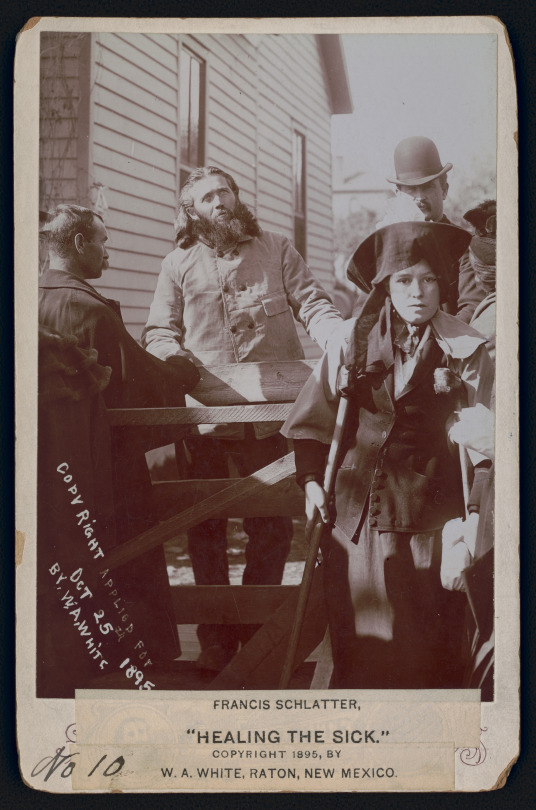


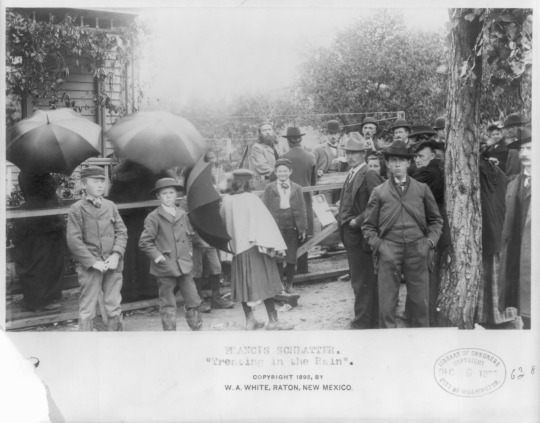

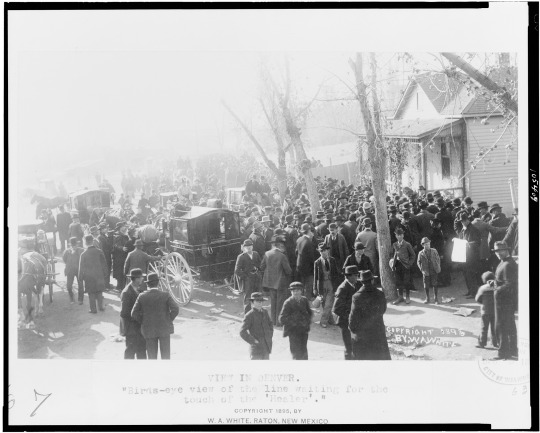
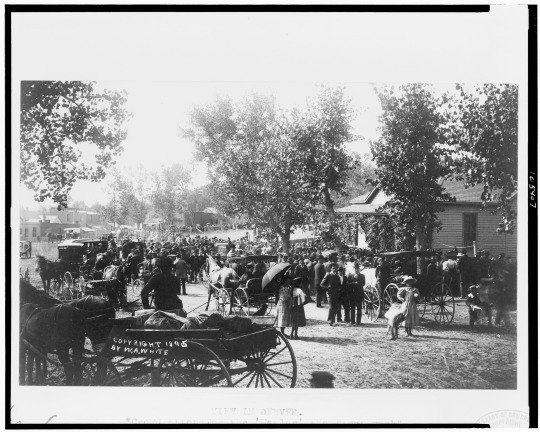


Denver, Colorado 1895: Crowds gathered outside the home of alderman Fox, waiting to see his guest Francis Schlatter, a cobbler and reputed worker of miraculous cures known as The Healer.
Francis Schlatter was born in the village of Ebersheim, Bas-Rhin, near Sélestat, in Alsace on April 29, 1856. In 1884 he emigrated to the United States, where he worked at his trade in various cities, arriving in Denver, Colorado, in 1892. There, a few months later, he experienced a vision at his cobbler's bench in which he heard the voice of the Father commanding him to sell his business, give the money to the poor, and devote his life to healing the sick. He then undertook a two-year, 3,000-mile walking pilgrimage around the American West which took him across eastern Colorado, Kansas, and Oklahoma, and then to Hot Springs, Arkansas, where he was arrested and jailed for vagrancy.
In early 1894 he escaped and headed west, walking across Texas, New Mexico, and Arizona and into southern California, where he began his first efforts at healing with the Indians of the San Jacinto Valley. After two months, he again took up his pilgrimage and traveled east across the Mohave Desert, living on nothing but flour and water. In July 1895 he emerged as a Christlike healer in the Rio Grande villages south of Albuquerque. There, while treating hundreds of sick, suffering, and disabled people who flocked to Albuquerque's Old Town, he became famous. Crowds gathered about him daily, hoping to be cured of their diseases simply by clasping his hands. The following month he returned to Denver, but did not resume his healings until mid-September. During the next few weeks, his ministry drew tens of thousands of pilgrims to a small home in North Denver. Schlatter is said to have refused all rewards for his services. His manner of living was of the simplest, and he taught no new doctrine. He said only that he obeyed a power which he called Father, and from this power he received his healing virtue.
On the night of November 13, 1895, he suddenly disappeared, leaving behind him a note in which he said that his mission was ended. Then, in 1897 news came out of Mexico that the healer's bones and possessions had been found on a mountainside in the Sierra Madre. At the same time, a New Mexico woman named Ada Morley published a book called The Life of the Harp in the Hand of the Harper which told of the healer's three-month retreat on her ranch in Datil, New Mexico, after his disappearance from Denver. The book, which carried the title the healer gave it, also contained a first-person description of his two-year pilgrimage, which he believed held the same significance for mankind as Christ's forty days in the wilderness. On departing the Morley ranch, Schlatter told Morley that God intended to establish New Jerusalem in the Datil Mountains, and the healer promised to return at that time.
Almost immediately after reports came out of Mexico announcing the healer's death, skepticism arose. Ada Morley, who had visited at length with Schlatter during his three-month stay at her ranch in New Mexico in early 1896, had her doubts. "The men who found the skeleton declared to have been [Schlatter's]," she said, "say it was resting as though it had never been disturbed. I know the coyotes would never have left it so if it had ever lain there bearing flesh."
The New York Times expressed doubts as well. "It does not appear that the human remains were actually identified as Schlatter's," the newspaper stated on June 19, 1897, "or that any identification was possible." However, the presence of the healer's possessions at the scene, especially his copper rod, convinced most people otherwise.
Over the next twenty-five years, several men arose claiming to be Francis Schlatter. One, a Presbyterian minister named Charles McLean, died in Hastings, Nebraska, in 1909, creating a controversy between skeptics and believers. Two others, August Schrader and Jacob Kunze, who formed a healing team that operated between 1908 and 1917, were arrested and jailed in 1916 for mail fraud. A final so-called imposter died in St. Louis, Missouri, in October 1922.
During the second half of the twentieth century, a renewed interest in Schlatter brought with it speculation about the claim of the healer who had died in St. Louis. Most recently, The Vanishing Messiah: The Life and Resurrections of Francis Schlatter (2016), argues that the healer conspired to stage his death in the mountains of Mexico and returned to the United States to continue healing in the eastern and southern parts of the country until his death in St. Louis in 1922.
84 notes
·
View notes
Text
Ranil takes charge for now, sets stage for new President
Ranil takes charge for now, sets stage for new President
DESCRIBING THE situation in Sri Lanka as “dangerous”, the country’s new Acting President Ranil Wickremesinghe on Friday said that he would not “allow anything unconstitutional” to happen, setting the stage for the Parliamentary process starting Saturday to elect a new leader on July 20.
Former Prime Minister Wickremesinghe’s remarks came after he was sworn in as Acting President following…

View On WordPress
#charge#Colombo#Express News#Express News Service#gotabaya rajapaksa#Indian Express News Service#president#Ranil#ranil wickremesinghe#sets#Sri lanka crisis#Sri lanka news#stage#takes#World News
0 notes
Note
"Oh n-not this time, m-my Songbird. I-I've let it slide a bit, l-let you have your f-fun, and it is f-fun for me too. However. Y-you've been p-pampering me far too much. It is YOUR turn t-to be looked after and have a d-day off."
.....Darling, love of my life, my lil sugar bear you're my precious lil princess and I feel you underestimate my strength. I'll literally handcuff , put a collar on you and throw you over my shoulder as if It's the last thing I'll do, darling. ~~ ☺️💞
Now, now sit down. I've got a special surprise for you. I've been looking for the past hours for Indian recipes and tried my best to recreate them for you, my love. Also why need a chair? These thighs were made for you to sit on , and why do anything when I can feed you myself 😌✨✨
And don't worry your pretty lil head about taking care of me, I'm doing fine, Hun. you should be more worried about how you are going to your work tomorrow after I finish with you tonight, I saw that birdcage in your room maybe I should put it in use since you decide to disobey 🙂☺️
(fgsfgsfdadgagrsdg I'm not backing up until that lil shit accepts his new fate, I'LL CRUSH HIM WITH MY THIGHS LIKE A FUCKING WATERMELON AND HE'S GONNA LOVE IT!!! )
I fucking laughed so hard reading this. I wanted this framed and on my wall it's fucking art safndkfjg
Words cannot describe, or emphasize enough, the absolute joyous, yet positively gremlin, shit eating grin expression that Krow's face bears, including the rare sight of him showing his fanged canines without holding his hand over his mouth to hide them.
"R-really now, t-threatening me w-with a good t-time? I-is the collar a s-shock one? I've ALWAYS w-wanted to try one of t-those. C-cause that sounds AMAZING."
Krow gives a delighted little giggle at the thought, and continues to grin up at you. And at the mention of you recreating various Indian dishes for him, the teasing persona does crack, revealing him to be truly touched at this gesture.
"Ah... D-Dove. Y-y-you didn't... n-need to. S-some of these are complex t-too..." this time he does cover his mouth, though not from shame at his teeth, but out of the overwhelming feeling of gratitude he has.
He looks back to you, smile returning. "Do you r-really think, a-after all this, w-with how much you've been s-spoiling me, lavishing me, I-I can let you just.... g-get away with it? No. Oh no no no n-noooo. It is MY turn to t-take care of you, a-and service you, in a-all the ways you w-want."
He'd laugh more. "O-oh you noticed the cage? L-lovely, isn't it? Eheh, g-going to try and punish me, my Dove? My b-beautiful Songbird?" he drops his voice into a whisper. "Do it. M-make me BEG."
((Two service doms both just like 'no u' at each other nskjDFznsdf Place your bets on who's gonna crack first dfgsndkfjg))
((Given that Krow is like... an extreme masochist, he'd BEG you to crush him with your thighs. Destroy him. Please.))
#krow asked and answered#krow in character#naughty krow#putting that tag there just in case nbdkf#the krow's nest#and this is seriously so fucking funny I love it so much
38 notes
·
View notes
Text
911 Garage Door Pomona


911 Garage Door Pomona
We're pleased to provide garage door installation and repair. 911 Garage Door Pomona is on time, trustworthy, and productive. Problems with your garage door should be fixed ASAP because they could endanger the security of your house. You can count on us for the quickest garage door part replacement.
______________
Address
719 Indian Hill Blvd
___________
Discount
New Rollera starting as low as $99.
New operators starting as low as $199.
New Garage doors starting as low as $249.
$75 off Garage Door Repair Service.
$100 off on all single Garage Doors.
$200 off On Double car steel insulated Garage Doors.
$100 off Single Door.
_____________
Payment Method : -
American Express.
Cash.
Discover.
Mastercard.
Visa.
__________
Working Hours : -
MON-FRI: 9am - 5pm /
SAT - SUN: 10am - 4pm
#Garage Door Repairs & Installation.#Garage Door Tracks.#Replace Garage Door.#Garage Door Spring Repair.
5 notes
·
View notes
Text

Still dependent on Russia, India exchanges its MiG-21 for the Su-30 MKI
The Number 4 Squadron of the Indian Air Force was converted from Mig-21 fighters to Su-30 MKI, continuing to depend on Russia since the Soviet era.
Fernando Valduga By Fernando Valduga 11/03/2023 - 12:30 in Military
Indian Air Force (IAF) pilots are ceasing to fly on the MiG-21 jets and moving to the Su-30MKI, with IAF Squadron Number 4 on October 30 performing the last out of the supersonic fighter that has been in service for 60 years.
The formal induction of the Su-30MKI took place on the same day, joining the MiG-21 in its final overflight.

The IAF depends on Russian defense companies for Su-30 MKI spare parts and publicly expressed difficulties with these suppliers in February 2022, during the large-scale invasion of Ukraine, as sanctions on Russia led to delivery failures.

Even with the flourishing of its partnership with the US, India remains a long-term strategic partner of Russia. The relationship with Russia in defense matters has a deep history and is necessary to maintain the Indian military platforms that, in many cases, date back to the Soviet era.
The decision to phase out the MiG-21 in favor of the Su-30 MKI and LCA fighters developed in the country was announced in 2011, when 476 jets in the fleet of 946 MiG-21 aircraft were lost in accidents over the decades. Initially scheduled for 2017, the replacement is still in progress, with two MiG-21 squadrons still in operation.

The MiG-21 was the first IAF supersonic jet, put into service in 1963 and in operation with Squadron Number 4 since 1966. The variant of the second-generation interceptor began to be delivered in 1964 and was used with great effect in conflicts with Pakistan in the periods of 1965 and 1971.

The Su-30 MKI was jointly designed by the Sukhoi Design Bureau and Hindustan Aeronautics Limited based on the Su-30 fighter. The MKI variant is a multifunctional combat aircraft that made its first flight in 1997. A major advance over the MiG-21 that the Su-30 MKI offers is a fly-by-wire control system.
The MiG-21 was highly maneuverable when it was first introduced, but today it is surpassed by aircraft with new avionics system.
Tags: Military AviationIAF - Indian Air Force/Indian Air Forcemig-21Su-30MKI
Sharing
tweet
Fernando Valduga
Fernando Valduga
Aviation photographer and pilot since 1992, has participated in several events and air operations, such as Cruzex, AirVenture, Dayton Airshow and FIDAE. He has work published in specialized aviation magazines in Brazil and abroad. Uses Canon equipment during his photographic work in the world of aviation.
Related news
HELICOPTERS
Black Hawk helicopters in accelerated delivery to Australia
06/11/2023 - 16:00
MILITARY
U.S. Navy receives second 'End Judgment Aircraft' Mercury updated
11/06/2023 - 2:00 PM
MILITARY
Aircraft carrier attack group USS Eisenhower arrives in the Middle East region
06/11/2023 - 12:00
MILITARY
Taiwan accelerates replacement of its F-5 with the new Brave Eagle advanced training jets
11/06/2023 - 10:00
MILITARY
South Korea plans to reduce production of KF-21 fighters
06/11/2023 - 08:46
MILITARY
US Air Force is testing the Pipistrel Velis Electro
06/11/2023 - 08:06
6 notes
·
View notes
Text

Happy Indian Air Force Day! Saluting the Guardians of the Sky from Mewar University 🛩️✈️
Mewar University extends warm wishes to the Indian Air Force on their special day!✨
On this Indian Air Force Day, we express our deepest gratitude to the brave men and women of the Indian Air Force for their unwavering dedication and service to our nation. Your courage inspires us all at Mewar University. 🙌🙏May you continue to soar to new heights, achieving excellence and glory. 🚀
#IndianAirForceDay #SaluteToHeroes #Cuet #MewarUniversity #IAF #भारतीयवायुसेनादिवस #ProudIndian #TopUniversityInRajasthan #GuardiansOfTheSky #IndianAirForce #AirWarriors #BestUniversityInRajasthan #KnowledgeToWisdom #Aircraft
2 notes
·
View notes
Text
Which is the Best Place for Office Party?

Do you know "how to overcome work-related stress?" Well, there is no denying fact that all employees are prone to work stress. Work-related stress doesn't just disappear when you head home for the day, when stress persists, it can take a toll on your health & well-being. Further, it can contribute to problems such as headaches, stomach, sleep disturbances, short temper, weakened immune system & difficulty concentrating. The stress will go on but amazingly, office parties serve as a venue for a break from the demanding office work & let employees get back to work free of the previous work stress & contribute to improving their productivity. Office parties have become the norm of modern society, offer an excellent socializing platform & create a spirit of unity among colleagues. During office parties, workers mingle, talk in an informal environment as well as share meals & all these triggers the human instinct of expressing family-like behavior & bonding. In addition to this, check out the beautiful images of the office party of the leading Web Development Company in Mohali.
What is the Need for Conducting Office Party?
Following are the reasons that state the importance of office party:
Office parties make the workplace livelier, and more energetic and make employees want their colleagues to feel like a family or a group of friends, not just workmates.
They get a chance to establish new connections with fellow employees from other departments, consequently, strong interdepartmental connections in department will lead to overall better cohesion.
Serving as interdepartmental networking, office parties act as an informal space where departments that would not interact or communicate on a normal workday meet, get a chance to gain knowledge & implement good management techniques.
Holding office parties means offering a gesture of appreciation to employees & go beyond way to appreciate employees in various ways.
Now,
Which is the Best Place for Office Party?

Being an owner of the company or employee, if you are looking for the best place for conducting an office party then your search ends here!! Yes, Culture Brew Exchange is known to be an amazing place for every party that is counted amongst the best bars in the city & is a trendy hangout for all. Culture Brew Exchange is situated at SCO 1, sector 26 in Chandigarh, a happening society by all means. Visiting here for the party means all can party hard with trendy, live music, craft beer, multi-cuisine, global, microbrewery, attractive mesh for industries & menu curated to pamper your plate. When it comes to the food menu, the brewery decides to travel across the globe to feature likes of Mexican & Continental on the menu along with old desi North Indian. The best time to visit Culture Brew Exchange is on weekends when the whole place is up & hopping. With an exuberant menu and an energetic ambiance, it is an ideal place for a night out on the town. Recently, one of the leading Web Development Company in Mohali conducted a New Year or office party at Culture Brew Exchange. All the Fortec team have enjoyed till the night ends, enjoyed snacks, delicious dinner, grooved at Karwaan band & the eye-catchy surrounding of Culture. Ultimately, they found it the best place for an office party & looking forward to visiting again. Check out the beautiful images of how Fortec believed in," The night is still just getting started."
About Fortec Web Solutions
Fortec Web Solutions Pvt. Ltd. is the leading Web & App Development Company in Mohali known for offering all IT services under one roof. Offering innovative & personalized software solutions, we make your business more successful in an economical way. We transform your business with powerful & adaptable digital solutions that satisfy the needs of today & unlock various opportunities for tomorrow.
Contact us now!
8 notes
·
View notes